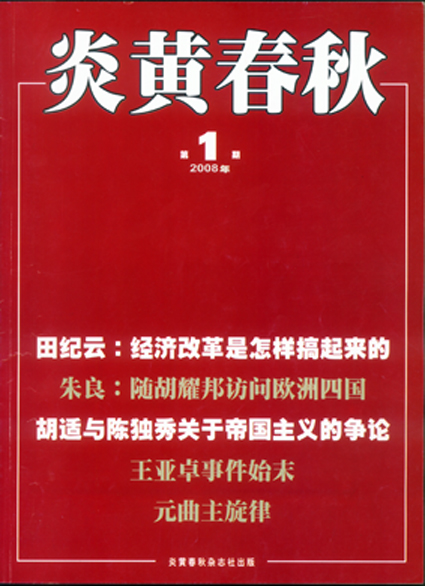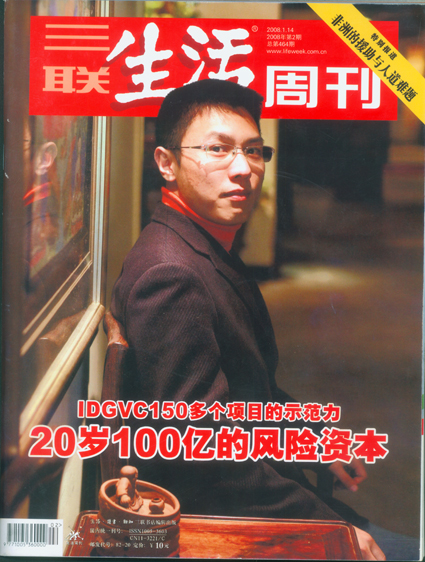A New Year, a New Hope
Spring and Autumn Journal
From Editorial, page 1, Jan 2008 issue
 A special year-end editorial reiterates the need for democratic reforms in China by appropriating language used during the 17th congress of Communist Party of China, where promotion of such reforms was frequent and unambiguous. The piece is fleshed out with several quotes from the congress, such as this one from Hu Jintao: "We should strengthen the democratic system, let democratic forms proliferate, increase democratic channels, and enforce the legality of democratic elections, protect people's right to know, right to participate, right to free expression, and right to supervise." The editorial goes on to suggest that both the fruits and costs of the past 30 years of reform and opening up are being unjustly distributed among Chinese, with those at the lowest rungs of society still seeing too little of the former. The journal urges the Chinese leaders to push the envelope on political reform in 2008 to bridge these gaps.
A special year-end editorial reiterates the need for democratic reforms in China by appropriating language used during the 17th congress of Communist Party of China, where promotion of such reforms was frequent and unambiguous. The piece is fleshed out with several quotes from the congress, such as this one from Hu Jintao: "We should strengthen the democratic system, let democratic forms proliferate, increase democratic channels, and enforce the legality of democratic elections, protect people's right to know, right to participate, right to free expression, and right to supervise." The editorial goes on to suggest that both the fruits and costs of the past 30 years of reform and opening up are being unjustly distributed among Chinese, with those at the lowest rungs of society still seeing too little of the former. The journal urges the Chinese leaders to push the envelope on political reform in 2008 to bridge these gaps.
Editor’s note: The editorial alludes to an article published last year entitled, "Democracy is a Good Thing", by Yu Keping, which added fuel to public debate over the merits of political reform in China. In many ways, the editorial echoes Yu’s notion of democracy. Although the latter points out its weaknesses and refrains from glorifying it, Yu calls it “the best political mechanism to date”. As the deputy chief of CPC’s central compilation and translation bureau, Yu represents a new generation of politicians in China, and the above magazine – which has former officials and party members at its helm – is seen as representative of progressives within the party.
The Life of Qin Yu
Life Week (三聯(lián)生活周刊)
From Society, page 88, issue no. 464, Jan 14th 2008
 Qin Yu, the former aid to the now-disgraced Shanghai Communist Party Secretary Chen Liangyu, has been sentenced to life imprisonment after a corruption scandal entangled Shanghai's most powerful politicians in 2006. Classmates and teachers say Qin was a hard-working, intelligent and reserved student. He studied Western values at East China Normal University, where he subsequently taught for six years. In September 1994, he was frustrated by not making vice-professorship, but just a month later, after recommendation by the school, he was selected to be the secretary of Chen Liangyu, then Shanghai's party vice-secretary and one of China's most prominent communist party leaders. With Chen's subsequent promotion to secretary, Qin moved up as well. It was during this time that he has served as a covert go-between for local government and businesses, facilitating bribes. Note that the cover photo shown is not of Qin Yu.
Qin Yu, the former aid to the now-disgraced Shanghai Communist Party Secretary Chen Liangyu, has been sentenced to life imprisonment after a corruption scandal entangled Shanghai's most powerful politicians in 2006. Classmates and teachers say Qin was a hard-working, intelligent and reserved student. He studied Western values at East China Normal University, where he subsequently taught for six years. In September 1994, he was frustrated by not making vice-professorship, but just a month later, after recommendation by the school, he was selected to be the secretary of Chen Liangyu, then Shanghai's party vice-secretary and one of China's most prominent communist party leaders. With Chen's subsequent promotion to secretary, Qin moved up as well. It was during this time that he has served as a covert go-between for local government and businesses, facilitating bribes. Note that the cover photo shown is not of Qin Yu.
Editor's note: It remains to be seen how the National Bureau of Corruption Prevention founded last year will investigate and deal with future cases of high-profile corruption; information about it is still scant. The aftermath of the Shanghai scandal is similar to last year's execution of Zheng Xiaoyu, the head of China's State Food and Drug Administration, which came quickly after the discovery that Zheng accepted bribes to approve new drugs.
- Both Panic and Optimism Over China's New Online Video Rules | 2008-01-16
- NEW COLUMN | 2007-12-24
- In the Footsteps of Wang Baoqiang | 2007-12-18
- The Evolution of Corporate Media | 2007-11-08
- 2008: We Will Come Back | 2007-08-27











